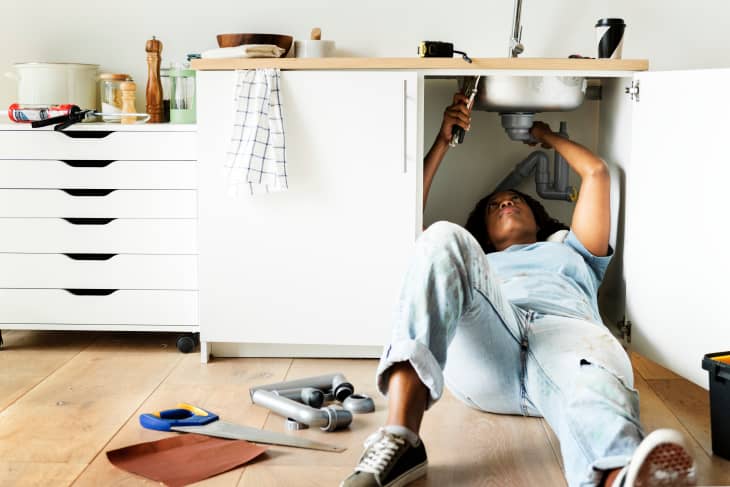5 Bad Habits Your Plumber Wishes You’d Stop Right Now
Whether you own or rent, it’s easy to fall into some badhome maintenancehabits. You might notactuallychange orclean air filtersas often as you should, for instance, or you might skip tedious chores like mowing the lawn every once in a while. And a lot of the time, that’s OK! But there are some bad home habits that can cost you big if you keep them up over time.
Plumbing problems in particular can often seem like they’re sudden — but in many cases, it’s a slow progression toward a big issue that’s fueled by lots of little mistakes. To avoid stress (not to mention unnecessary plumbing bills), it’s important to treat your toilets, garbage disposals, shower drains, and more with a little bit of care. Here, pro plumbers offer their advice on five bad habits you should definitely squash before they lead to trouble.
Overloading the Garbage Disposal
Garbage disposals are convenient, but they’re not a replacement for your actual garbage can. Problems can be caused by overusing or overloading your unit. Marty Brown, divisional merchandise manager of plumbing forHome Depot, suggests limiting your garbage disposing activities to just one cup of food waste at a time. You should also run hot water from the tap while the disposal is running to help keep the drain clear of debris.
Remember, too, that not everything is garbage disposal-friendly. Corn cobs, artichokes, avocado pits, banana peels, chicken bones, fish bones, egg shells, coffee grounds, and potato peels are allthings you should never put in your garbage disposal, as they’re likely to clog, so don’t risk it — throw these in your waste collection or compost bin. Aside from that, Brown says, “Never pour grease or liquid fat into your garbage disposal because as these fats solidify, they clump up and block the flow of food and water.”
Flushing Things Other than Toilet Paper
There’s a reason every public restroom asks you to not to flush paper towels, tampons, or pads. You might not have a clog from these items right away, but they can get caught in pipes and lead to problems later. In other words, even if you’ve been able to flush a non-toilet paper item in the past without issue, that doesn’t mean you’re in the clear!
Things thatseemtoilet paper-adjacent aren’t necessarily equally flushable (even if they claim to be). Baby wipes, for instance, are a no-go, as are so-called“flushable” wipes. Save both for the trash. And make sure kids know the rules, too: “If you have small children, make sure they know not to flush toys and other inappropriate items,” Brown says. “Also, don’t attempt to flush excessive amounts of toilet paper. Instead, flush in increments as needed.”
忽略你的管道(字面以外的因素ly)
Pipes don’t start and end in your home, and your exterior can have an impact on their health. Don’t ignore pipes when planning any large landscaping projects, as any trees you plant can present a future plumbing issue. “Roots are amazingly powerful and sometimes destructive, especially with plumbing,” stresses Mike Grijavalva, plumber atSacramento Plumbing Solutions. “When roots grow over or into your pipes, problems will follow — and fixing these issues requires the cost of tearing your yard apart plus all the plumbing work.”
Grijavalva says it’s OK to plant trees on your property, butdoconsider where you place them and the nature of their root systems. When in doubt, he says, call your plumber — they know more about trees than you might imagine.
Brushing Your Hair in the Shower
“Small hairs might not seem problematic, but over time, they can build up and clog your drain,” says Brown. Brushing your hairbeforeyou step into the shower is an easy way to limit the amount of future work you’ll need to do unplugging the drain.
Of course, you’re still likely to lose some hair in the shower. To catch those before they wander into your pipes, add a grate, tub strainer, or drain screen. Consider using one in any high-traffic bathroom sinks, too, which can also get, ahem, hairy.
Waiting to Address Slowing Drains
Drains often slow from substances like hair, toothpaste, food, and more, and it’s easy to ignore the issue if the sink or shower is still usable. Putting off the fix, though, won’t make the problem go away. “It’s important to be able to take care of a clog as soon as possible because if a blockage is allowed to build up, it can lead to burst pipes,” says Brown.
Small clogs can totally be fixed the DIY way, with snakes, augers, plungers, andother drain cleaning tools. (You can evenunclog a drain with a vacuum!) If they grow into big clogs, though, you’ll have to call in a potentially pricey pro. Save yourself the bill and get to fixing as soon as you see an issue.

